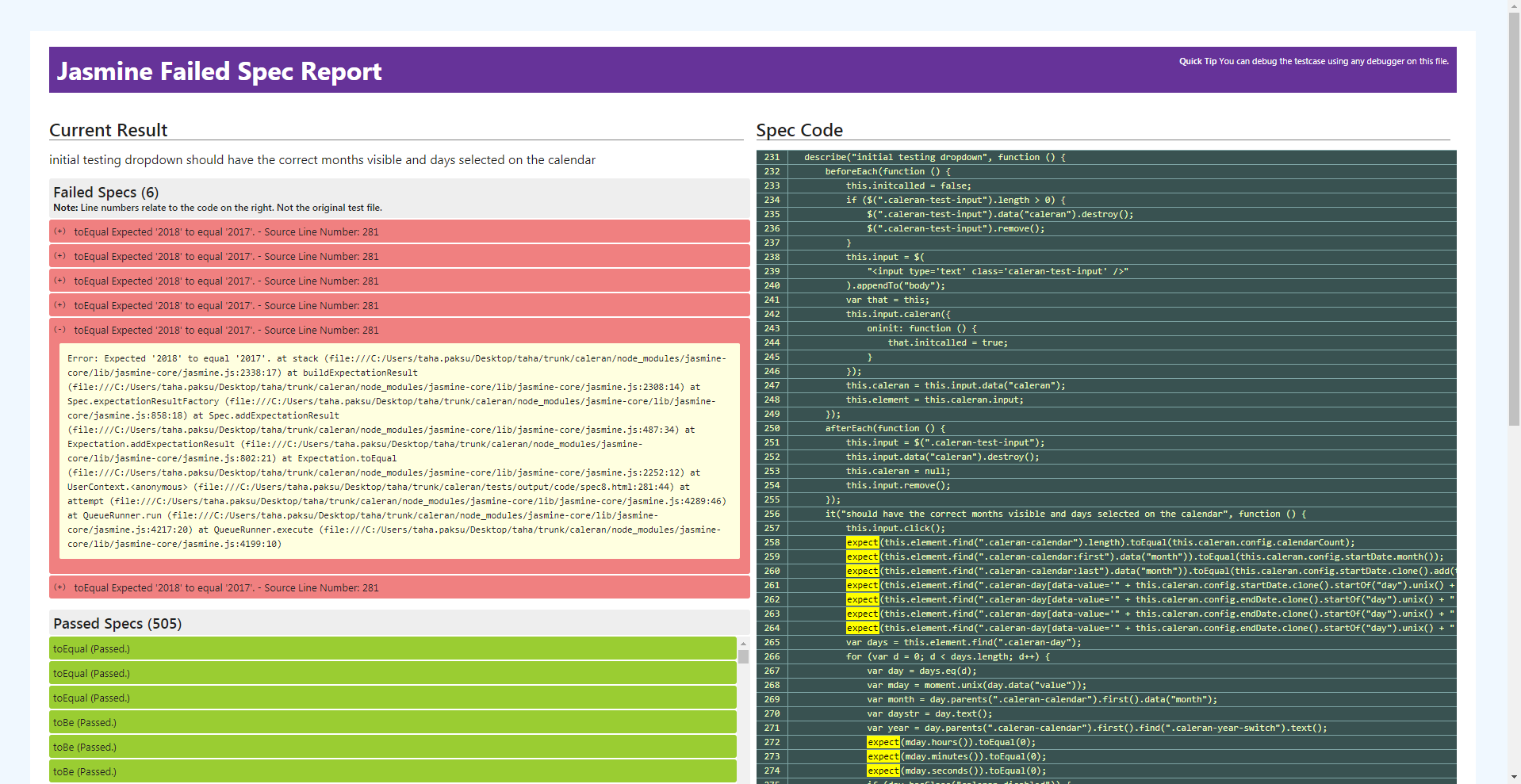karma-code-reporter v0.1.1
karma-code-reporter
Prepares a test report which each failed case has it's own report and inline test case. I tested this with grunt + karma + jasmine configuration and I don't know it works on other test runners like mocha etc. It's open for collaboration.
Screenshots
 Index File Preview
Index File Preview
 Spec File Preview
Spec File Preview
Installation
There are two installation options:
- Install using
npm installcommand:
$ npm install karma-code-reporter --save-dev- Add
karma-code-reporteras adevDependencyinside yourpackage.jsonfile
{
"devDependencies": {
"karma-code-reporter": "~0.1.0"
}
}Options
* required
outputPath*
(string) Defines the path that the output files will be created at. The folder will contain an index.html file which contains a list for each failed test, and the spec*.html files which contain the live versions of failed tests and the related code portion.
[output folder]
|--> index.html
|--> spec1.html
|--> spec2.html
.testFiles*
(array) The test files which will be ignored during html generation. This is needed because we don't want any other test cases to interfere with the failing spec.
cssFiles
(array) The extra css files which you want to include in the failed spec HTML files.
jsFiles
(array) The extra javascript files which you want to include int the failed spec HTML files.
Configuration
If you use a karma.conf.js file to define karma configuration, you can add this plugin's configuration like this:
// karma.conf.js
module.exports = function(config) {
config.set({
reporters: ['code'],
codeReporter: {
outputPath: 'tests/output/code',
testFiles: ['tests/*.test.js'],
cssFiles: ['build/css/style.min.css'],
jsFiles: ['build/js/script.min.js']
}
});
};Or if you are using Gruntfile.js to configure karma, you can use it like this:
module.exports = function (grunt) {
// Project configuration.
grunt.initConfig({
karma: {
dist: {
options: {
files: [],
basePath: '',
frameworks: ['jasmine'],
reporters: ['progress', 'code'],
port: 9876,
colors: true,
browsers: ['PhantomJS'],
singleRun: true,
codeReporter: {
outputPath: 'tests/output/code',
testFiles: ['tests/*.test.js'],
cssFiles: ['build/css/caleran.min.css']
}
}
}
}
});Contributing
In lieu of a formal styleguide take care to maintain the existing coding style.
Release History
- 0.0.1 initial release
- 0.0.2 added screenshots to README, fixed wrong version number in Installation section
- 0.0.3 fixed bound calculation, added report visibility hidden until tests are completed
- 0.0.4 added responsive styles
- 0.0.5 split regexes for correct quote type handling
- 0.0.6 removed 'UserContext' from log.stack parsing regex
- 0.0.7 improved case surroundings detection (describe, beforeEach, afterEach)
- 0.0.8 fixed source filename and line number parsing from log reports, updated lodash
- 0.0.9 lodash security fix reported by dependabot
0.0.10 previous version bump fixes, not so important
0.1.0 - added more source line definitions such as "@file?id:line:pos" and " at Anonymous function (file?id:line:pos) for parsing, - added folder separation by browser type, - fixed some exceptions
- 0.1.1 - fixed index file title and path mismatch




